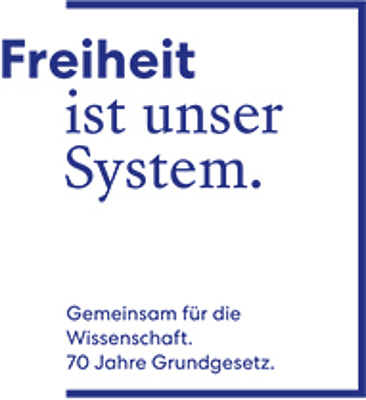
Kontakt
Presse, Kommunikation und Marketing
Tel.: +49 228 833-144
Fax: +49 228 833-441
presse[at]avh.de
The Alliance of Science Organisations in Germany takes advantage of the anniversary of the Basic Law to debate opportunities, responsibility and the threats to academic freedom.
"Sciences, research and teaching shall be free" according to Article 5 of Germany’s Basic Law which came into force 70 years ago. German science is taking advantage of the anniversary to debate the success stories and opportunities, but also the threats to this freedom, and to consider the responsibilities ensuing from it. Initiated by the Max Planck Society, “Freedom is our system. Together for science” is a campaign by the alliance of the ten leading German science organisations emphasising the importance of independence in research and teaching through a series of events, speeches, debates, and articles whilst critically examining their own system and highlighting potential global threats to academic freedom.
Up to the autumn, the science organisations are running a series of events on various aspects of academic freedom with a focus on five thematic areas:
I. “The freedom I mean”: Article 5, a German individual right.
II. “Unity and justice and freedom”: preconditions for the rule of law and democracy.
III. No freedom without responsibility: on the handling of new knowledge.
IV. “Loneliness and freedom”: tradition in upheaval? On interference and growing legitimacy pressure.
V. Limits of freedom: restrictions on research worldwide.
Academic freedom is a basic right that should be defended at all times. Recent developments amongst some international partners have therefore given cause for concern. Populist tendencies have also found fertile ground in which to sow yet more seeds of doubt about scientific findings and research fields. At the same time, science is under ever greater pressure to deliver, above all, “useful” and economically exploitable results – which excludes many important research questions. However, science’s own system of incentives has to change, too, in order to ensure the future of existing as well as new free research: If, for example, the volume of scientific publications continues to be the benchmark for third-party funding, competitive success and careers in science, this impedes free research on less prominent and publishable topics. Not least, a differentiated public conversation on complex scientific topics is hampered by problematic developments on social media, such as fake news or the focus on closed group discussions. But science still needs tools and meticulous methodology to meet the growing complexity of the challenges facing society as a whole, such as climate change and the energy transition, digitisation and demographic change, and to convey relevant scientific knowledge to society in an appropriate format.
For additional information on the campaign, events and organisations involved, visit www.wissenschaftsfreiheit.de.
The Alliance of Science Organisations in Germany is a union of the leading German research organisations. It regularly issues statements on important science policy issues. The Leibniz-Gemeinschaft is a member of the Alliance and assumed the chair for the year 2019. The other members of the Alliance are the Alexander von Humboldt Foundation, the German Academic Exchange Service, the Deutsche Forschungsgemeinschaft (DFG), the Helmholtz Association, the German Rectors’ Conference, the Leibniz Association, the Max Planck Society, the German National Academy of Sciences Leopoldina and the German Council of Science and Humanities.
The Alexander von Humboldt Foundation
Every year, the Alexander von Humboldt Foundation enables more than 2,000 researchers from all over the world to spend time researching in Germany. The Foundation maintains a network of well over 29,000 Humboldtians from all disciplines in more than 140 countries worldwide – including 55 Nobel Laureates.

